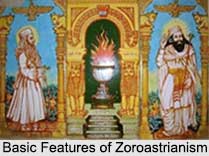 Basic Features of Zoroastrianism, such as Messianism, judgment after death, heaven and hell, and free will have influenced other religious systems. Zoroastrianism is one of the most ancient religions of the world.
Basic Features of Zoroastrianism, such as Messianism, judgment after death, heaven and hell, and free will have influenced other religious systems. Zoroastrianism is one of the most ancient religions of the world.
The basic features of Zoroastrianism are as follows:
1. Zoroastrianism is a monotheistic religion with a kind of internal dualism in the Godhead. Apparently there seemed to be two Gods in Zoroastrianism. One is the God of good called "Spenta Mainyu" and is often identified with Ahura Mazda Himself. The second God is the evil God or God of Evil and Darkness called "Angra Mainyu" or Ahriman.
2. Ahura Mazda, meaning the Wise Lord" is regarded as all powerful all wise and all good. He is also the creator and the ruler of the world. He sometimes reveals himself to selected men through his angels who always surround God, waiting for his orders.
3. God is subtle and it is not possible for ordinary men to reach him by ordinary knowledge. Only revelation through angels can help to know God.
4. God is transcendent arid immanent. He is father, brother and friend to a man.
5. The World is a battlefield for Spenta Mainyu and Angra Mainyu, i.e. good versus evil. It is considered to be the fight between Light and Darkness. Ultimately, Light (good) will prevail over the Darkness (bad) and Ahura Mazda will gain victory over Ahriman.
6. Man has been granted free will. He is expected to exercise it by preferably choosing the force of Good, fighting that of evil. For this, leading a life of righteousness is necessary. However, choosing good does not imply praying but working. The best work or action lies in fighting invaders, destroying wild things, irrigating barren land etc. Performing all those actions which promote civilization.
7. Zoroastrianism believes in life after death. It holds a belief in resurrection of the dead and the Day of Judgment. In this life, man"s place is determined strictly in accordance with the Law of Retribution. Those whose righteous deeds excel the evil ones are sent to Heaven and those whose evil deeds balance heavily over the righteous ones are sent to Hell.
8. It is a religion of perfect ethical purity and dedication, devoid of petty ceremonialism. The basic ethical virtues that men inculcate are good thoughts, good words and good deeds. Although some prayer or worship of Ahura Mazda is prescribed, the religious life consists in the cultivation of moral virtues. Zoroastrianism believes in the Eternal law of Asha, which means righteousness in ones day-to-day life. It signifies truth, order, discipline and harmony and includes acts of purity, truthfulness and beneficence.
9. Fire is regarded as pure and is treated as a symbol of divine purity. At times, it is equated with God. Parsees have fire temples and they are known as Fire Worshippers. Thus it is said that Zoroastrians worship through prayers and symbolic ceremonies that are conducted before a sacred fire that symbolizes their God.
10. Zoroastrianism believes in the existence of angels to wait on God and evil spirits to accompany Ahriman.
11. Zoroastrianism teaches equality and brotherhood of all.
12. According to Zoroastrianism, dead body is the most impure; and fire, water and earth are sacred and pure. Hence, neither cremation nor burial or throwing into sea is acceptable to them.
13. Zoroastrianism prescribes life of a householder and does not favour asceticism.









